May 28, 2025 | 20:05 GMT +7
May 28, 2025 | 20:05 GMT +7
Hotline: 0913.378.918
May 28, 2025 | 20:05 GMT +7
Hotline: 0913.378.918
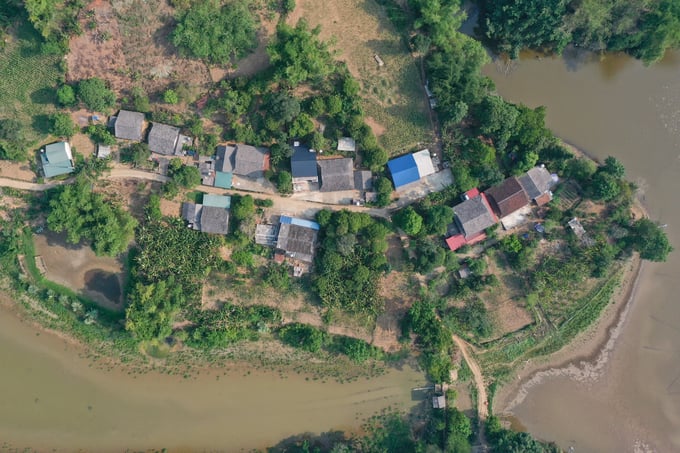
A corner of Ba Be lake where Ba Be Farmstay of Hung "man" is located. Photo: Tung Dinh.
Ba Be lake in early summer, the sun was not burning but sweltering and suffocating. Even if we stood still, sweat ran all over our faces. However, that sweltering, suffocating feeling almost completely disappeared when we set foot in Dang Van Hung's Ba Be Farmstay, located near the westernmost edge of the lake. Taking a quick look, this was a resort designed and built in harmony with nature.
This billion-dong property is Hung's second in Ba Be district. It is also the result of 11 years of boldness, hard work and determination of the Dao man on the path of starting a business based on experience tourism and community tourism.
11 years ago, also on a hot May afternoon, Dang Van Hung was with his buffalo, harrowing the family's field in Na Nghe village, Nam Mau commune, Ba Be district. At that time, there was a group of Western tourists trekking through his field. Seeing Hung working in the field, they stopped to take pictures and film.
Having a cheerful and honest nature, Hung invited the whole group to his house to drink water. Fortunately there were a Vietnamese guide in the group and a Western man who had been in Vietnam for a long time, so communication was not a problem. "Seeing I was living a hard life, they wondered why I was such a big house but not thinking of making a homestay for tourists,” he said.
Back then, he only knew what they said, but homestay, experience tourism, and community tourism were still very vague concepts for the young Dao man. Fortunately, Hung was able to meet many guides and tour guides as fields were near the trekking route, and so he actively learned and listened to the advice of anyone who came by.
Ambiguity and skepticism gradually turned into curiosity and confidence. He came to realize that the first step into the tourism industry was to renovate the toilets and living quarters so that guests can stay overnight. To tourists, the experience was important, but sanitary and comfort was still the most crucial thing. In 2012, in addition to repairing the house, Hung invested in buying 4 mattresses and building 2 decent toilets. After the basic works were done, he started welcoming guests to the homestay.

Hung "man" told the story about more than 10 years of working toward the path of tourism, under his billion-dollar property in Coc Toc village, Nam Mau commune, Ba Be district. Photo: Tung Dinh.
The hard work and diligence of the Dao youth earned travel companies’ goodwill. One told ten, ten told hundred, they recommended guests to visit Hunghomestay, the traditional house of the Dao people in Na Nghe village, Nam Mau commune of Ba Be district. In order to please the guests, Hung "man" also tried to learn more English by himself, mostly from professional guides.
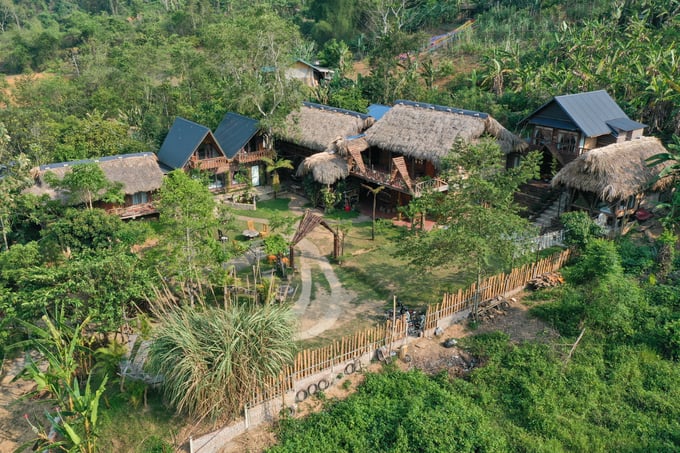
Ba Be Farmstay seen from above, harmoniously blended with nature. Photo: Tung Dinh.
Hung is a Dao, and the Dao has to live on the mountainside. Perhaps from his grandfather’s life, his father's life and beyond, no one in the family would have thought of going down the mountain. However, when he made his steps into the tourism industry, Hung understood that he had to be in a place where there was water to develop. He chose Coc Toc village, located at the western end of Ba Be lake to “go down the mountain”.
In the early days, working in the fields day and night could only help him afford a mattress. Hung wanted to build a toilet according to people's advice, but VND 70 million was such a massive amount of money that he didn't know where to get it. So Hung asked his parents. Scared of the risk, but seeing his son's determination made his grandparents gave in and allowed him to take the land use right and pawned it at the bank to borrow VND 100 million.
The land use right was everything they had, a legacy left by many generations. VND 100 million at that time was a fortune even for people in urban areas, let alone the Dao people in the steep Phja Bjooc mountain range. After holding the bank's money, Hung clearly felt the weight of the risk, but perhaps he made the right choice. Growing up in a purely agricultural family, Hung knew how to cherish money. Wherever he could, he accumulated and bought more land in Coc Toc. From 2012 to 2018, he was able to gather enough land to create his own “farmstay”. Hung went down the mountain.
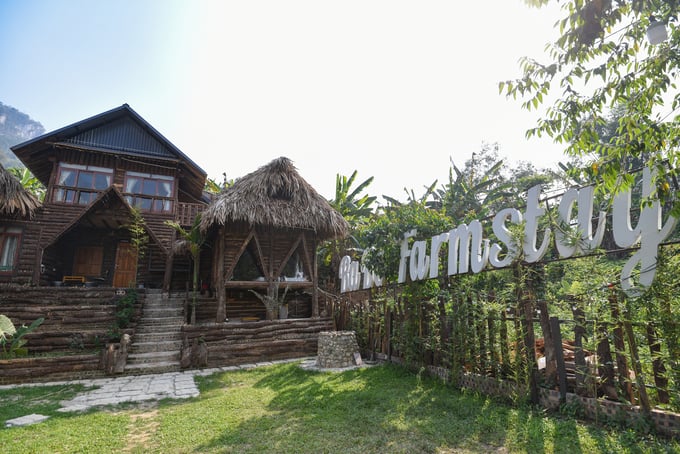
The works of this farmstay are meticulously and carefully done. Photo: Tung Dinh.
In the Tay language, Na means field, Pe means lake, so now Hung has 2 facilities, in both Na and Pe, in which Na Nghe has a community house that can accommodate 25 guests, and near Ba Be lake (Slam Pe) he has a 12-room farmstay area, with 10 private rooms and 2 community rooms, which can accommodate up to 75 guests.
Although the whole village and the whole commune follow tourism and accommodation models, Hung's Ba Be Farmstay is somehow very different. It is not neatly constructed like some newly built places, but it is not as plain as the traditional houses of the Tay people in Ba Be. It fits well with the charming, quiet scene in this corner of the lake.
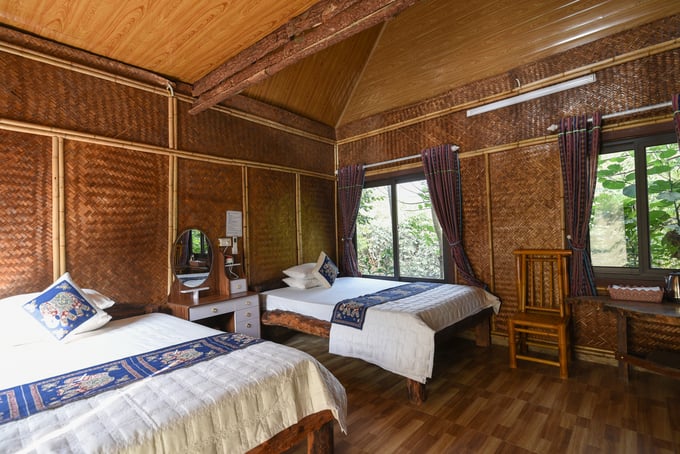
High-class furniture in the rooms of Ba Be Farmstay. Photo: Tung Dinh.
Those who have known Hung for a long time say that this man is like an open book. whether he likes it or not, he speaks his mind truthfully. The same goes for guests at his house, if he sees that they are unfit for the farmstay, he won't accept them, and if they are, he would gladly leave work and go drinking with the guests without question.
It is the same in work, he does not take all the work into his own hands, instead, he tries to do things perfectly one at a time. Ten years ago, when working as a farmstay owner and leading a trekking group, he only accepted a maximum of 25 people, because more people would be difficult to control and many problems would arise. Now the number of guests staying at his place can go up to 100 people, but if they want to go experience the mountains, he still only accepts the same number as when he started the business.
Regarding the room at his house, it is not too spacious but airy. The facilities are well-invested. Just looking at blankets, sheets, pillows, cushions and the guests can understand that they are all expensive things. Hung likes that. Things need to be neat and orderly. Therefore, his guests may not be crowded but all of them are regulars.
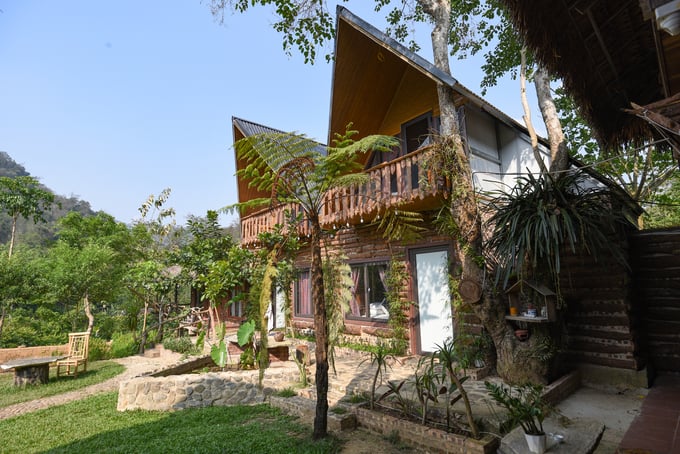
A corner of the property Hung "man" owns in Coc Toc village. Photo: Tung Dinh.
Starting from working on accommodations for tourists, then leading guests to the forest and mountain, now Dang Van Hung has expanded the business to experience tourism. Depending on the season, his guests can go to harvest rice, catch crabs, shrimp, and fish to cook meals for themselves. While implementing these activities, Hung links up with people in the region, together sharing profits from tourism. He thinks this is the best way for the whole community to develop together in a sustainable way.
Translated by Samuel Pham
/2025/05/25/4127-3-073637_820.jpg)
(VAN) Thanks to the promotion from an FAO-implemented project, vegetable production in greenhouses in Moc Chau has seen strong development, from 1.5 hectares in 2021 to nearly 50 hectares in 2024.

(VAN) FAO has recently supported USD 140,000 to implement the project 'Risk mitigation human-animal interface risks through disease control initiatives in pig farming.'

(VAN) The People's Committee of Tra Vinh province has approved an adjustment to the investment policy for the Green Hydrogen Plant project, increasing its area to approximately 52.76 hectares.
![Reducing emissions from rice fields: [2] Farmers’ commitment to the soil](https://t.ex-cdn.com/nongnghiepmoitruong.vn/608w/files/news/2025/05/05/dsc08881jpg-nongnghiep-140632.jpg)
(VAN) Clean rice cultivation model in Thuong Tan commune, Bac Tan Uyen district, is assisting local residents in achieving sustainable agriculture by substantially reducing costs, increasing productivity, and protecting the environment.

(VAN) At the conference to disseminate Resolution No. 68, AgriS introduced its digital agricultural ecosystem and reaffirmed its commitment to accompanying the Government in promoting private sector development and sustainable agriculture.

(VAN) 'Blue Ocean - Blue Foods' initiative is designed to restore marine ecosystems and establish sustainable livelihoods for local communities by cultivating a minimum of 1,000 hectares of cottonii seaweed in the first three years.
/2025/05/21/4642-3-112707_603.jpg)
(VAN) The V-SCOPE project has made direct contributions to three out of six pillars of the Comprehensive Strategic Partnership between Vietnam and Australia.